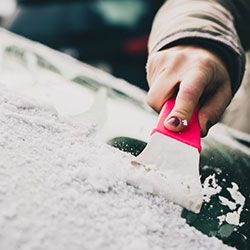 You know it's coming, the snow, slush and cold weather.
You know it's coming, the snow, slush and cold weather.
Canadian winters demand you take extra caution on the road and with your car. Don't get caught unprepared. It's time to schedule a visit with your mechanic to do a tune-up and inspection of your vehicle now before we're knee-deep in snow.
Winter Preparedness for Your Vehicle
Be Car Care Aware (BCAA) is a program operated by the Automotive Industry Association of Canada to help drivers know how to better care for their vehicles. To ensure you're ready to roll when the snow flies, the BCAA recommends you (or your mechanic) check your vehicle's:
- Engine oil, coolant, power steering, brake, and transmission fluids
- Hoses and belts to make sure they are not cracked, brittle, frayed, or loose
- Battery to ensure connections are clean, tight, and free of corrosion
- Brake system including the brake linings, rotors, and drums
- Exhaust system to look for leaks, damage, or broken components
- Heating, ventilating, and air conditioning system to ensure the vehicle's defrost works properly
- Steering and suspension system including shock absorbers, struts, as well as chassis components
- Tires, including tire pressure, tread, and wear
- Lighting (inside and out) to ensure you can see and will be seen
DIY Winter Vehicle Maintenance
While there are certain things you'll likely want your mechanic to do for you, there are a few items that you can take on yourself to ensure you're ready for the winter:
- Buy a fresh jug of windshield wiper fluid that's specific for winter use as it won't freeze as easily.
- Replace your wiper blades with a set of winter wipers that are sturdier.
- Take out of hiding your winter car safety kit. With a few basic items handy in your car—like jumper cables, a flashlight, first-aid kit, extra clothes and food, and a bag of sand for traction—you could find yourself getting back on the road quicker if you run into problems.
- Keep an eye on the weather and the date if you change your tires seasonally. Generally, it's recommended that winter tires be installed when the temperatures dip to 7° Celsius, however for insurance purposes they should typically be on the car from November until May.
Also, if you change your tires seasonally make sure your auto insurer knows. Many insurers offer a winter tire discount that, if available, could help you save up to five percent on your premiums.
Does your car insurance need a tune-up too?
Your car insurance may also be in need of some regular maintenance. Compare car insurance quotes today to see if you can get the coverage you need at a price that won't give you the chills.




